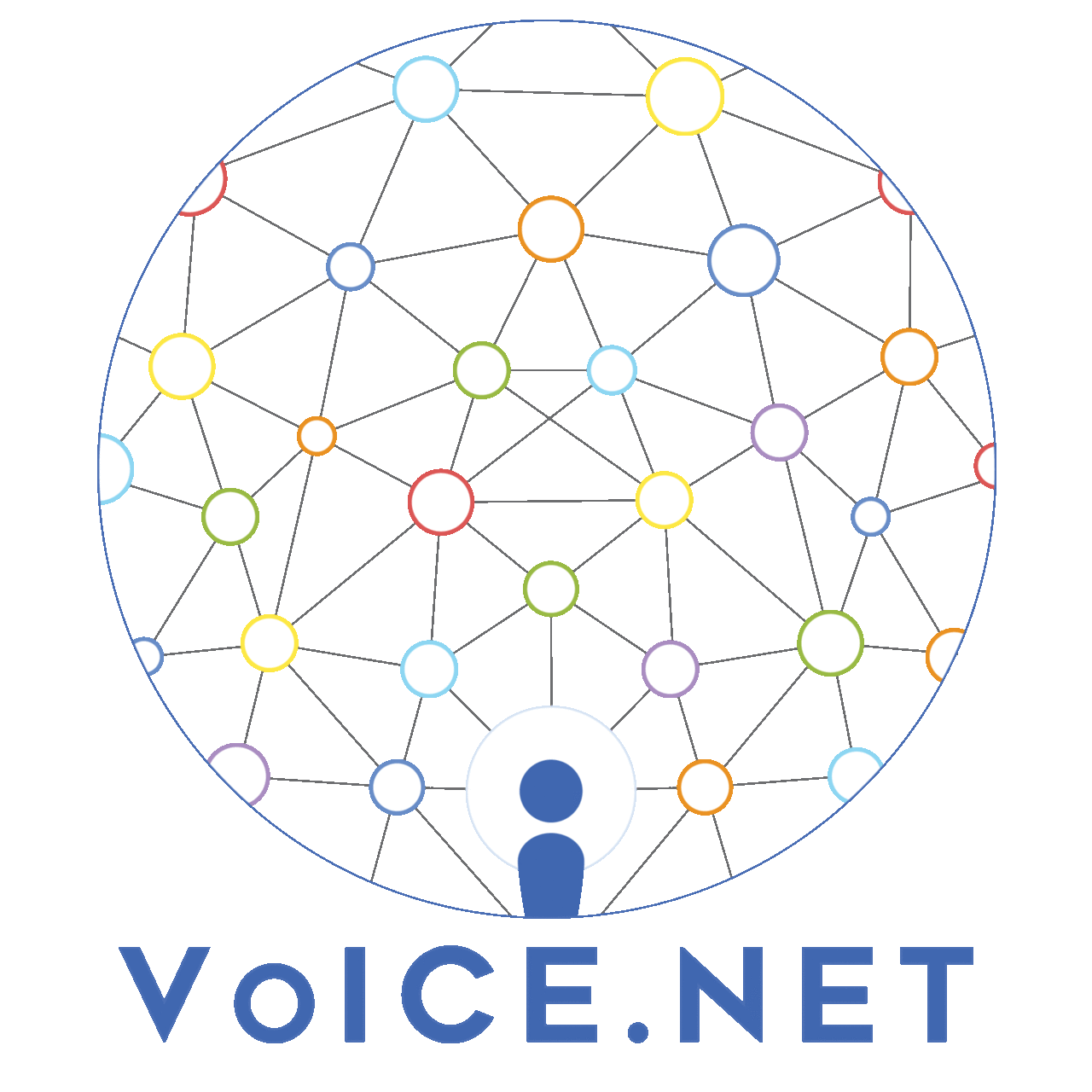
ter nformation, ommunication & ducation work
Global Knowledge Network On Voter Education - learning from each other
Making Polling Venues Accessible and Voter Friendly for People Living With Disabilities
-By Darren Hickes, Research Officer, Fijian Election Office
Introduction
Taking historic steps towards promoting franchise, the Fijian Elections Office [FEO] has extended its focus towards making polling venues and elections in general, accessible to persons living with disabilities. The steps or leaps that has been undertaken in the last three years has been through genuine commitment of the Fijian Elections Office to ensure that the 2018 General Election has greater levels of involvement, participation and ownership by persons living with disabilities. Whilst persons living with disabilities are by far a minority in the country, the FEO took positive steps in engaging with representative organizations to bring about changes in the electoral process and procedures that would promote persons living with disabilities achieving high levels of involvement in the General Election. The FEO actively believes that there are neither drawbacks nor waste of any resources when it comes to promoting the accessibility for voters living with disabilities and we believe that the outcome, however small, is worth the value of every dollar spent, every hour dedicated and every vote cast.
Positive Steps from 2014
The FEO was established in 2014 and had very little time in the 2014 General Election to undertake the massive steps it was able to in 2018. However, the FEO in 2014, in a bid to ensure active participation, employed various means for the inclusion of voters living with disabilities in the electoral process for the 2014 General Election. This resulted in 84.60 per cent voter turnout and Fiji’s lowest ever recorded invalid vote count – 0.75 per cent.
The Multinational Observer Group [MOG] in 2014 General Election report found that: “The FEO made some Polling Venues accessible by building ramps for wheelchair access, during training; Presiding Officers were taught how to assist voters with disability. Voter education materials developed by the FEO, included YouTube videos in sign language. The 2013 Constitution was also translated into Braille.”The MOG also noted that “Polling Staff and communities should be commended for their efforts to ensure all Fijians had the opportunity to vote.”
Post-election, the Supervisor of Election, Mr. Mohammed Saneem, actively promoted and pursued maximum inclusiveness in the electoral process. The FEO when developing its Strategic Plan [2015-2019], under Objective 4 titled “assess requirements for voters with disabilities and special needs” and under Goal 6, required the Director Operations to liaise with Government Organizations, Civil Society Organizations and private agencies to assist in identifying locations of people with disabilities and to develop and implement strategies to allow disabled voters to have access to the electoral process.
Pacific Regional Disability Rights Dialogue
In 2015, the FEO was invited by the International Foundation for Electoral Systems [IFES], to participate in an election disability BRIDGE workshop in Indonesia. The lessons from the workshop enabled the FEO to hold the first ever Pacific Regional Disability Rights Dialogue [PRDRD] 2016, with support from Australian Department of Foreign Affairs and Trade, PIANZEA Network and the Pacific Islands Forum which was attended by disability organization representatives from around the Pacific and heads of Election Management Bodies from the region.
Mr. Saneem described the event on 31st August, 2016, as a historic occasion which saw the formalization of one of the key working groups to enhance electoral practices for future elections in Fiji – the Election Disability Access Working Group [EDAWG]. “At the PRDRD, the FEO undertook this commitment that we would formalize an actual Election Disability Access Working Group,” he said. “We also indicated that the FEO wanted to create a platform where there would be direct involvement of DPO’s in assisting the FEO to make services more inclusive. The [EDAWG] will be formed by all disabled organization representatives together with Pacific Disability Forum and the Fiji National Council for Disabled Persons.”
The move enabled frequent and more collective discussions and workshops on how the election process could be further refined to make it more inclusive.
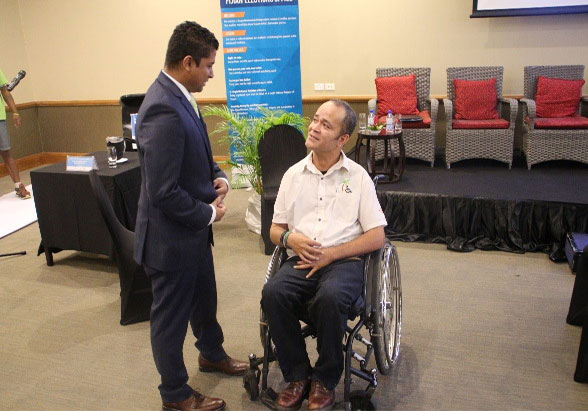 Signing of Terms of Reference
Signing of Terms of Reference
On the same day, a Terms of Reference [ToR] was signed between the FEO and the Pacific Disability Forum, the Fiji National Council for Disabled Persons, Fiji Society for the Blind, Fiji Association of the Deaf, Spinal Injuries Association of Fiji, Counterstroke Fiji, Fiji Disabled Peoples Federation, Fiji Vocational Technical Training Centre for Persons with Disabilities, Psychiatric Survivors Association, Fiji Paralympics Committee, Fiji Crippled Children’s Society, United Blind Persons of Fiji and the Western Disabled Persons Association. The ToR outlined the roles and responsibilities of the Election Disability Access Working Group (EDAWG) stating that it shall ensure that persons with disabilities have equal access and are included in all aspects of the electoral process in Fiji by:
1. Ensuring persons with disabilities get an opportunity to access a voter registration card:
(a) Persons with disabilities may request for mobile registration to the extent possible in order to be registered and get a card.
2. Selecting accessible voter registration and polling station locations:
(a) All voter registrations and polling station locations should be accessible to all voters with disabilities to the extent possible.
3. Conducting civic and voter education in all accessible formats:
(a) All civic and voter education materials should be understood by all voters with disabilities.
4. Mechanisms shall be in place on alternative voting methods such as postal vote.
5. Voters with disabilities should be able to the extent possible access the FEO website.
6. Election results shall be provided in as many mediums as possible so, as to allow voters with disabilities to be informed.
7. All polling venue/polling station layouts shall be designed to the extent possible in an accessible manner to cater for voters with disabilities.
8. To the extent possible we shall allow voters with disabilities the opportunity to take part in voter education programs.
9. The EDAWG shall recommend procuring materials suitable for voters with disabilities to the extent possible.
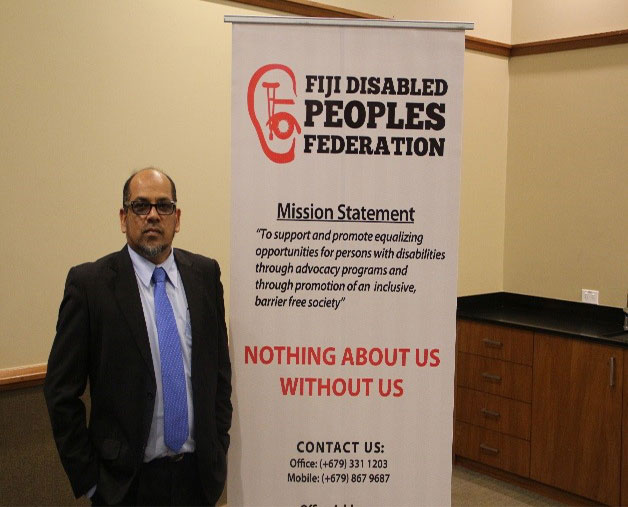
The ToR signed between the FEO and Election Disability Access Working Groups was the first in the Pacific region and the FEO ensured that the ToR were achieved through appropriate funding, dedication on necessary resources and allocation of senior level staff with decision making powers to ensure that the ToR were not only a paper document but a significant asset of the FEO’s preparations for the following General Election.
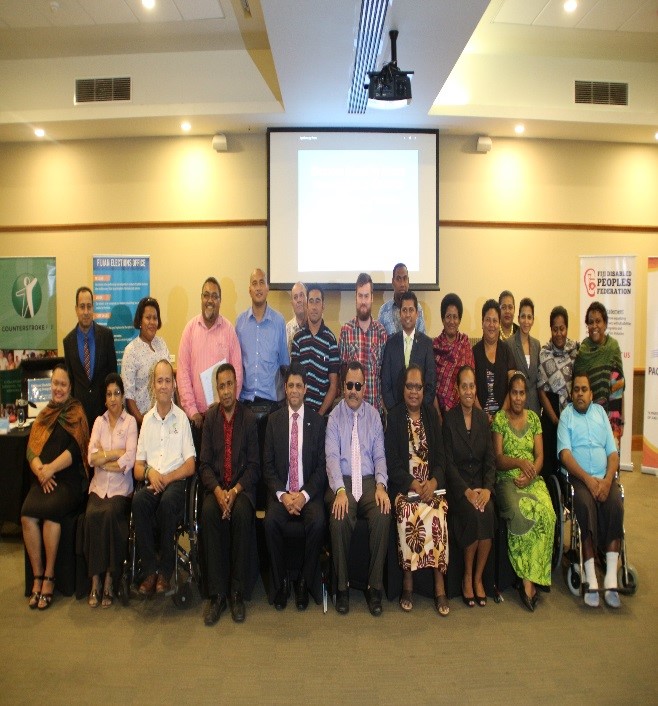
During the cycle, the FEO actively engaged with disability groups to draw from their views, opinions and ideas on active processes during the cycle as well as for processes on Election Day. This facilitated a greater commitment by all stakeholders in ensuring that the ultimate achievement is inclusivity. The FEO made the first milestone achievement when it developed the website with disability access features including text to speech reading, color changing, font size changing, etc.
Since then the EDWAG has met 18 times and by the 2018 General Election had successfully achieved the goals set out two years earlier.
Positive Steps in 2018 General Election
Mr. Saneem announced in early 2018 that people living with disabilities, pregnant women and the elderly were to be given priority at Polling Venues and cardboard voting screens could be taken outside to be placed on the laps of those who were on wheelchairs or could not come inside.
After the announcement, the President of the Fiji Disabled Persons Federation, Mr. Josh Wakaniyasi commended the Electoral Commission and the FEO. “In terms of accessibility to the polling venues, we are glad to see that there is accessibility not only for persons with disabilities but also for pregnant women as well as the elderly,” he said. “This does not mean we are taking opportunities away from anyone else but it is an added opportunity to ensure more people are able to access the polling venue. Another approach is resource and support to ensure that polling stations are mobile. This gives confidence to people with disabilities to vote because there is flexibility within the confines of the law that governs the right to vote.”
A few months later the Fijian Parliament passed the Rights of Persons with Disabilities Act and Fiji also ratified the Convention on the Rights of Persons with Disabilities which meant that Fiji was committed to fulfilling its obligations under the Convention. The FEO took the opportunity to further increase participation and accessibility. This meant persons living with disabilities may be able to select a person of their own choice who is a registered voter, to assist the person with disabilities to mark their ballot paper inside the polling station on Election Day or during Pre-Poll.
The FEO also expanded the Postal Voting option to the elderly and persons living with disabilities who could not leave the vicinity of their homes or the hospital to cast their vote by means of sending their secret envelope which contained the marked ballot paper, back to the FEO for counting. Care facilities such as old people homes and rehabilitation centers were approved for pre-polling allowing convenient and inclusive voting. With Polling scheduled for November 14, 2018 in Fiji, people living with disabilities would be given the same accessibility and opportunities as any other voter.
Out of the 1436 Polling Venues which the Fijian Elections Office operated during the 2018 General Election, 208 venues had disability access while the remaining venues also ensured at least some form of access or had the mobile cardboard voting screen which could be taken to whoever needed it outside the polling station. This procedural accommodation helped persons with disabilities to vote in a dignified manner. Procedures that were in placed in the 2014 General Election were expanded to allow persons with disabilities to choose freely who would assist them. This simple accommodation can have a huge impact in whether a voter turns up or not.
Looking Towards 2022
The FEO has built on its commitment since the 2014 General Election in ensuring that every Fijian is able to cast their vote. The procedures were improved so that persons with disabilities have equal access to the electoral process. Persons with disabilities were provided voting options to accommodate their various needs at all stages of the electoral process.
The FEO is seeking to improve on its services to all Fijians including persons with disabilities. The FEO will continue engaging stakeholders and disability organizations to remain consistent with its service delivery to persons with disabilities. A holistic review of the electoral procedures will ensure inclusivity on all levels for persons with disabilities for the next General Election.
Introduction
Taking historic steps towards promoting franchise, the Fijian Elections Office [FEO] has extended its focus towards making polling venues and elections in general, accessible to persons living with disabilities. The steps or leaps that has been undertaken in the last three years has been through genuine commitment of the Fijian Elections Office to ensure that the 2018 General Election has greater levels of involvement, participation and ownership by persons living with disabilities. Whilst persons living with disabilities are by far a minority in the country, the FEO took positive steps in engaging with representative organizations to bring about changes in the electoral process and procedures that would promote persons living with disabilities achieving high levels of involvement in the General Election. The FEO actively believes that there are neither drawbacks nor waste of any resources when it comes to promoting the accessibility for voters living with disabilities and we believe that the outcome, however small, is worth the value of every dollar spent, every hour dedicated and every vote cast.
Positive Steps from 2014
The FEO was established in 2014 and had very little time in the 2014 General Election to undertake the massive steps it was able to in 2018. However, the FEO in 2014, in a bid to ensure active participation, employed various means for the inclusion of voters living with disabilities in the electoral process for the 2014 General Election. This resulted in 84.60 per cent voter turnout and Fiji’s lowest ever recorded invalid vote count – 0.75 per cent.
The Multinational Observer Group [MOG] in 2014 General Election report found that: “The FEO made some Polling Venues accessible by building ramps for wheelchair access, during training; Presiding Officers were taught how to assist voters with disability. Voter education materials developed by the FEO, included YouTube videos in sign language. The 2013 Constitution was also translated into Braille.”The MOG also noted that “Polling Staff and communities should be commended for their efforts to ensure all Fijians had the opportunity to vote.”
Post-election, the Supervisor of Election, Mr. Mohammed Saneem, actively promoted and pursued maximum inclusiveness in the electoral process. The FEO when developing its Strategic Plan [2015-2019], under Objective 4 titled “assess requirements for voters with disabilities and special needs” and under Goal 6, required the Director Operations to liaise with Government Organizations, Civil Society Organizations and private agencies to assist in identifying locations of people with disabilities and to develop and implement strategies to allow disabled voters to have access to the electoral process.
Pacific Regional Disability Rights Dialogue
In 2015, the FEO was invited by the International Foundation for Electoral Systems [IFES], to participate in an election disability BRIDGE workshop in Indonesia. The lessons from the workshop enabled the FEO to hold the first ever Pacific Regional Disability Rights Dialogue [PRDRD] 2016, with support from Australian Department of Foreign Affairs and Trade, PIANZEA Network and the Pacific Islands Forum which was attended by disability organization representatives from around the Pacific and heads of Election Management Bodies from the region.
Mr. Saneem described the event on 31st August, 2016, as a historic occasion which saw the formalization of one of the key working groups to enhance electoral practices for future elections in Fiji – the Election Disability Access Working Group [EDAWG]. “At the PRDRD, the FEO undertook this commitment that we would formalize an actual Election Disability Access Working Group,” he said. “We also indicated that the FEO wanted to create a platform where there would be direct involvement of DPO’s in assisting the FEO to make services more inclusive. The [EDAWG] will be formed by all disabled organization representatives together with Pacific Disability Forum and the Fiji National Council for Disabled Persons.”
The move enabled frequent and more collective discussions and workshops on how the election process could be further refined to make it more inclusive.

On the same day, a Terms of Reference [ToR] was signed between the FEO and the Pacific Disability Forum, the Fiji National Council for Disabled Persons, Fiji Society for the Blind, Fiji Association of the Deaf, Spinal Injuries Association of Fiji, Counterstroke Fiji, Fiji Disabled Peoples Federation, Fiji Vocational Technical Training Centre for Persons with Disabilities, Psychiatric Survivors Association, Fiji Paralympics Committee, Fiji Crippled Children’s Society, United Blind Persons of Fiji and the Western Disabled Persons Association. The ToR outlined the roles and responsibilities of the Election Disability Access Working Group (EDAWG) stating that it shall ensure that persons with disabilities have equal access and are included in all aspects of the electoral process in Fiji by:
1. Ensuring persons with disabilities get an opportunity to access a voter registration card:
(a) Persons with disabilities may request for mobile registration to the extent possible in order to be registered and get a card.
2. Selecting accessible voter registration and polling station locations:
(a) All voter registrations and polling station locations should be accessible to all voters with disabilities to the extent possible.
3. Conducting civic and voter education in all accessible formats:
(a) All civic and voter education materials should be understood by all voters with disabilities.
4. Mechanisms shall be in place on alternative voting methods such as postal vote.
5. Voters with disabilities should be able to the extent possible access the FEO website.
6. Election results shall be provided in as many mediums as possible so, as to allow voters with disabilities to be informed.
7. All polling venue/polling station layouts shall be designed to the extent possible in an accessible manner to cater for voters with disabilities.
8. To the extent possible we shall allow voters with disabilities the opportunity to take part in voter education programs.
9. The EDAWG shall recommend procuring materials suitable for voters with disabilities to the extent possible.

The ToR signed between the FEO and Election Disability Access Working Groups was the first in the Pacific region and the FEO ensured that the ToR were achieved through appropriate funding, dedication on necessary resources and allocation of senior level staff with decision making powers to ensure that the ToR were not only a paper document but a significant asset of the FEO’s preparations for the following General Election.

During the cycle, the FEO actively engaged with disability groups to draw from their views, opinions and ideas on active processes during the cycle as well as for processes on Election Day. This facilitated a greater commitment by all stakeholders in ensuring that the ultimate achievement is inclusivity. The FEO made the first milestone achievement when it developed the website with disability access features including text to speech reading, color changing, font size changing, etc.
Since then the EDWAG has met 18 times and by the 2018 General Election had successfully achieved the goals set out two years earlier.
Positive Steps in 2018 General Election
Mr. Saneem announced in early 2018 that people living with disabilities, pregnant women and the elderly were to be given priority at Polling Venues and cardboard voting screens could be taken outside to be placed on the laps of those who were on wheelchairs or could not come inside.
After the announcement, the President of the Fiji Disabled Persons Federation, Mr. Josh Wakaniyasi commended the Electoral Commission and the FEO. “In terms of accessibility to the polling venues, we are glad to see that there is accessibility not only for persons with disabilities but also for pregnant women as well as the elderly,” he said. “This does not mean we are taking opportunities away from anyone else but it is an added opportunity to ensure more people are able to access the polling venue. Another approach is resource and support to ensure that polling stations are mobile. This gives confidence to people with disabilities to vote because there is flexibility within the confines of the law that governs the right to vote.”
A few months later the Fijian Parliament passed the Rights of Persons with Disabilities Act and Fiji also ratified the Convention on the Rights of Persons with Disabilities which meant that Fiji was committed to fulfilling its obligations under the Convention. The FEO took the opportunity to further increase participation and accessibility. This meant persons living with disabilities may be able to select a person of their own choice who is a registered voter, to assist the person with disabilities to mark their ballot paper inside the polling station on Election Day or during Pre-Poll.
The FEO also expanded the Postal Voting option to the elderly and persons living with disabilities who could not leave the vicinity of their homes or the hospital to cast their vote by means of sending their secret envelope which contained the marked ballot paper, back to the FEO for counting. Care facilities such as old people homes and rehabilitation centers were approved for pre-polling allowing convenient and inclusive voting. With Polling scheduled for November 14, 2018 in Fiji, people living with disabilities would be given the same accessibility and opportunities as any other voter.
Out of the 1436 Polling Venues which the Fijian Elections Office operated during the 2018 General Election, 208 venues had disability access while the remaining venues also ensured at least some form of access or had the mobile cardboard voting screen which could be taken to whoever needed it outside the polling station. This procedural accommodation helped persons with disabilities to vote in a dignified manner. Procedures that were in placed in the 2014 General Election were expanded to allow persons with disabilities to choose freely who would assist them. This simple accommodation can have a huge impact in whether a voter turns up or not.
Looking Towards 2022
The FEO has built on its commitment since the 2014 General Election in ensuring that every Fijian is able to cast their vote. The procedures were improved so that persons with disabilities have equal access to the electoral process. Persons with disabilities were provided voting options to accommodate their various needs at all stages of the electoral process.
The FEO is seeking to improve on its services to all Fijians including persons with disabilities. The FEO will continue engaging stakeholders and disability organizations to remain consistent with its service delivery to persons with disabilities. A holistic review of the electoral procedures will ensure inclusivity on all levels for persons with disabilities for the next General Election.
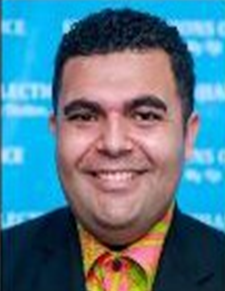
Research Officer
Fijian Elections Office (FEO)